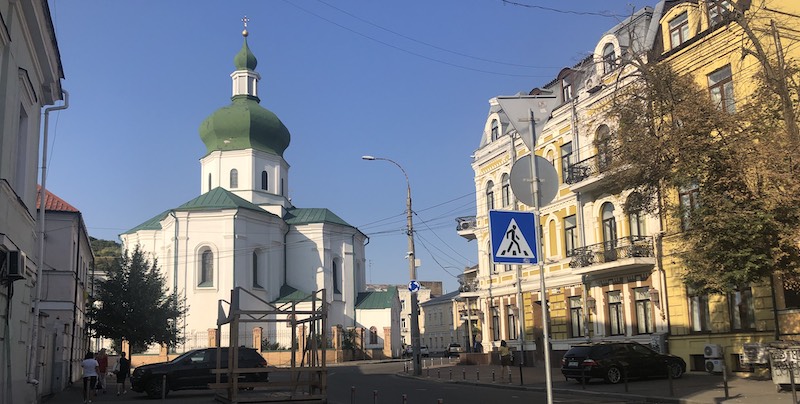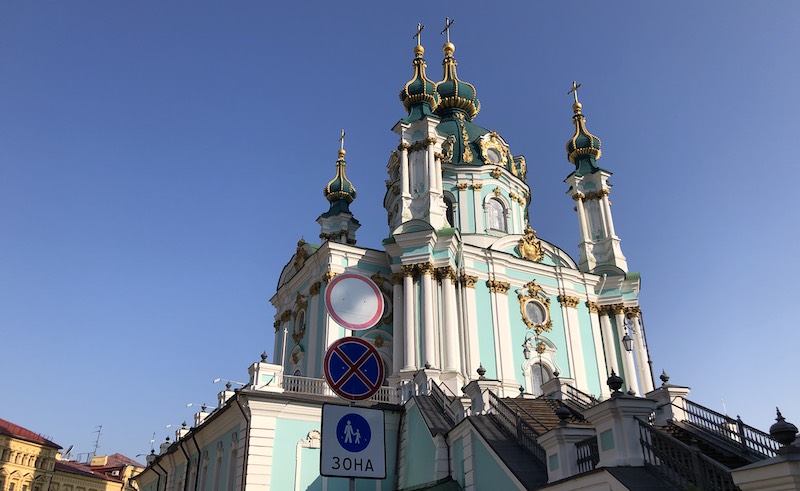
Closed Libraries and Fading Light: On Life in Kyiv, August 2022
Hometown Dispatches from Myroslav Laiuk
I borrowed William Faulkner’s book Light in August from the university library three days before the first strikes on Kyiv in February. My electronic reader card shows the date. There were no people in the reading room; everyone was at home updating the news and packing their bags. The librarian asked when I would return the book. I might never return it, I replied. She didn’t laugh.
Half a year has passed and August is almost over. I haven’t returned the book, although I should have done it a long time ago. The library is closed. There is a war.
On the morning of February 24, I was packing my books into big carton boxes. If Kyiv were to be occupied and there was an opportunity to rescue my library, it would be faster and easier with those boxes. I also wanted to put them in the distant corner of the room, away from the window, to protect from possible fire.
Recently I’ve found a pile of ashes which used to be a bookshelf in one of the destroyed apartments in the Kyiv suburbs. This ash was different; it was whiter and lighter than regular ash. The apartment owner is a refugee now. On the phone she asked us who was working in the debris of her home, hoping she could keep a small something—a cup or a figurine—as a memory. In the evening we realized that almost everything in this apartment had burned down; nothing left intact.
Faulkner explained the title of Light in August as follows: there is a day or two in the middle of August when the weather suddenly becomes chilly and you feel the taste of autumn, “a lambence, a soft, a luminous quality to the light, as though it came not from just today but from back in the old classic times,” and in this light fauns, satyrs, and Olympian gods may arise in our contemporary world. In one of the episodes, light in August is the one that leaves and grass breathe in so it remains on the ground even when the night comes.
My friend sniffs the air and notes that it is quite good in Kyiv right now. And then, after a silence, he adds: but everything feels as if it’s cracked.
A poet I know said once that August is still summer, but everything is already clear. At the mall I met another poet, a friend who is currently engaged in the intelligence of the Armed Forces. He knows the above quote very well. I take yellow plums, he takes some August fruits, and we go outside to walk through Kyiv at night until curfew begins.
Here, in the old Podil district, every piece of space is significant and “classic.” Christianity was adopted here a thousand years ago, and Podil still houses one of the oldest universities in Eastern Europe. Here is the place where the baroque Peter and Paul Church from 1610 was located; it was destroyed by the Bolsheviks in 1935. The Church abbot was Borys Ten, a translator of the Iliad and the Odyssey into Ukrainian, who was sentenced to ten years in the labor camps of the far east of Russia. Borys Ten called Mykola Zerov his godfather, and as an abbot he baptized Zerov’s son. Zerov was a Ukrainian intellectual who was shot by the Soviets in 1937, so he didn’t finish his translation of the Aeneid.
 The Ascension Florovsky Convent. Photo by Myroslav Laiuk
The Ascension Florovsky Convent. Photo by Myroslav Laiuk
The Frolivsky monastery is in front of the former site of the Peter and Paul Church. In 1712, the nuns from the Voznesensky Monastery were moved here. The mother of Ivan Mazepa—the Ukrainian hetman who dared to go against Tsar Peter I—was the abbess of that monastery.
My friend sniffs the air and notes that it is quite good in Kyiv right now. And then, after a silence, he adds: but everything feels as if it’s cracked.
Really, it’s not bad in Kyiv right now: premieres are taking place at theaters, cafes are selling the same croissants, and people are adopting puppies. Once in awhile, something explodes, but August is August. Reading this book by Faulkner is also a light in August. I’m unlikely to finish the reading, but holding the book in my hands, flipping through it while drinking coffee… it’s the same light, for now.
 St. Andrew’s Church in Kyiv. Photo by Myroslav Laiuk
St. Andrew’s Church in Kyiv. Photo by Myroslav Laiuk
A friend says that the war can drag on until the fall, flow into the winter, and end in a cycle at the end of the winter. It will be a cold and poor winter. Many of us will not be alive. We have lost a lot, but we will lose more. Many of our acquaintances have died, and more will die. (“No more joy for us in the sumptuous feast when riot rules the day,” reads the Iliad, Book 1). Indeed, “everything is already clear.”
Here it is: August. We dress more warmly and look for remnants of soft and luminous light in the grass and leaves. In this light, heroes from classic works are seen, noble and majestic, but at the same time they are torn and wounded. They want to say something, but then they close their mouths. What will they tell us? What happened is already the same classic story—remote, difficult to recall details, open to interpretation, cut off, lost forever.
Myroslav Laiuk
Born and raised in a small village in Western Ukraine, Myroslav Laiuk is the author of three poetry collections, two novels, and a forthcoming children’s book. He is a winner of the Smoloskyp Literary Award (Ukraine), the Kovaliv Fund Award (USA), the Oles Honchar Prize (Germany and Ukraine), and the Litakcent Literary Award (Ukraine.) His first novel Babornia was a finalist for the 2016 BBC Book of the Year Award in Ukraine. Myroslav’s work has been translated into eleven languages, and his poetry has been set to music by two Kyiv-based music groups of international repute: Dakh Daughters and Oy Sound System. He holds a PhD in Literary Studies from Kyiv-Mohyla Academy in Kyiv, where he currently teaches. In 2018, Myroslav was honored as one of the most innovative young leaders in Ukraine in The Kyiv Post’s Top Thirty Under Thirty award program.



















